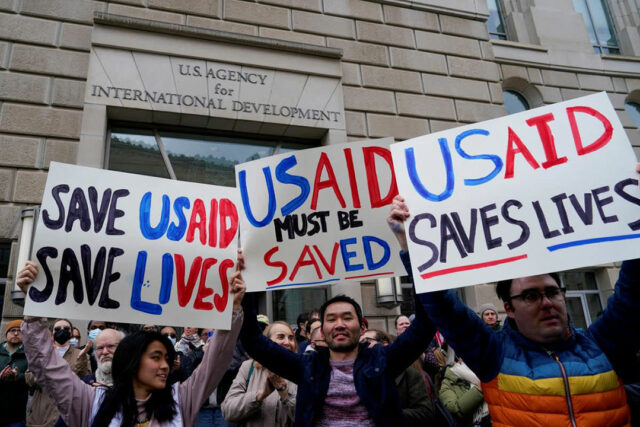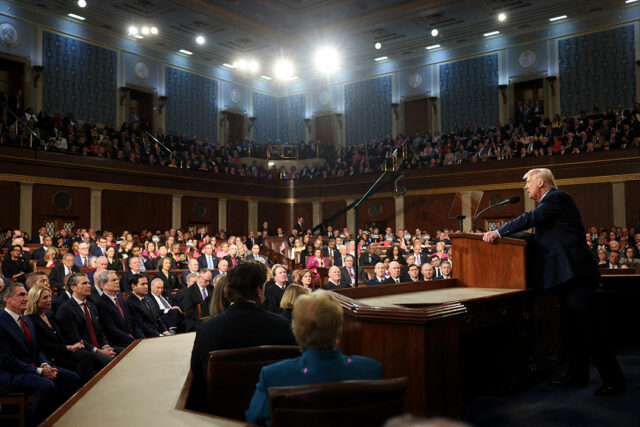THE recent arrests of several Chinese nationals and two Filipinos on espionage charges show growing security threats to the Philippines and the need for decisive government action to curb foreign intelligence activities.
According to Aaron-Matthew Lariosa of the US Naval Institute, these individuals were allegedly conducting aerial surveillance and reconnaissance of Philippine Navy and Coast Guard facilities near the South China Sea. They were also accused of targeting US-Philippine joint military installations and infrastructure using LiDAR, an advanced sensor technology (see “PRC and LiDAR in the Philippines,” Foundations for Defense of Democracies,” Feb. 3, https://tinyurl.com/2yq6bpnw). Although the full legal details of the charges remain unclear, these developments raise urgent concerns about the extent of foreign intelligence operations within Philippine territory and the steps necessary to neutralize them.
President Ferdinand Marcos, Jr. expressed that he was “very disturbed” by these reported activities, as should the entire Philippines, given their potential implications for national security. While these arrests involved only a handful of individuals, they raise concerns whether these cases are isolated incidents or part of a larger, more coordinated effort. These developments prompt urgent questions about the presence of sleeper agents within the country and the possible extent of People’s Republic of China’s (PRC) espionage and intelligence-gathering operations within Philippine territory.
PRC’s strategic approach to warfare often incorporates intelligence-gathering as a means of gaining an advantage over its adversaries. While deception is a key principle in Sun Tzu’s Art of War, which states that “all warfare is based on deception,” not all intelligence operations rely on deception, nor is deception always necessary for intelligence work. However, in the context of the recent alleged espionage cases, understanding PRC’s broader strategy, including its use of covert tactics, is crucial. These cases emphasize some of the intelligence methods that could be at play within the Philippines and what the public needs to be aware of.
HUMINT
The recent sleeper agent operations exemplify PRC’s long-term reliance on human intelligence (HUMINT) to infiltrate foreign societies and gather sensitive information. Integrating agents seamlessly into society under some kind of cover allows them to collect sensitive information over periods of time. One of the Chinese nationals had reportedly maintained a cover in the Philippines for over five years, posing as an ordinary resident while allegedly mapping military bases, Enhanced Defense Cooperation Agreement (EDCA) sites, and newly established power plants. The National Bureau of Investigation (NBI) also stated that these Chinese nationals were believed to have engaged in aerial reconnaissance via drone operations, collecting data about the Philippines’ naval assets, among others, while posing as “buyers of marine products, roaming around the city, and surveying for stations selling the products.” Aside from these publicly available details, the case suggests a broader pattern of covert intelligence operations.
Historical precedent for sleeper agents in the Philippines dates to World War II, when Japanese operatives embedded themselves in local communities to monitor Filipino and American activities. Similarly, if recent instances of espionage are not isolated incidents, they could signal a systematic effort by the PRC to position long-term intelligence assets within the country, mirroring past tactics used to gather information and influence local dynamics.
TECHINT
HUMINT efforts in this case were reinforced by Technical Intelligence (TECHINT) operations — the collection of intelligence through electronic and surveillance technology. Recent reports suggest that some of the suspects used a Toyota RAV4 outfitted with a GNSS RTK (Real-Time Kinetic) satellite system, a high-precision geospatial mapping tool (“Chinese engineer, 2 Filipinos nabbed for espionage targeting Philippine security,” Asia News Network, Jan. 21, https://tinyurl.com/24gvclog). Unlike your standard GPS, this system allows for the creation of detailed 3D terrain models, which could be used to map strategic military locations and troop movements. While ordinary GPS is common in consumer vehicles, this specialized system suggests an intent to gather precise geospatial intelligence beyond standard navigation.
Additionally, solar-powered surveillance cameras were found in Palawan, monitoring Philippine Coast Guard’s movements (“Chinese spies surveilled Philippine military installations, officials say,” Indo-Pacific Defense Forum, Feb. 15). The presence of these devices raises concerns about possible foreign surveillance networks operating within critical areas. It was reported that any intelligence collected was then sent “in real-time to a remote location” (“Authorities arrest two for espionage,” Palawan News, Jan. 30).
PRC CITIZENS AND ITS BUSINESSES
However, the PRC’s intelligence operations in the Philippines may extend beyond military-related surveillance to include economic infiltration. According to Anthony Ching and Lade Jean Kabagani of the Daily Tribune, these suspects held positions in Manila- and San Juan-based companies to provide legitimate covers for their prolonged stay in the Philippines.
Perhaps most concerning is the PRC’s use of domestic legislation to compel its citizens and businesses to support state intelligence efforts — a strategy that aligns with the People Liberation Army’s (PLA) broader approach to integrating civilian resources into national security operations.
According to veteran journalist Yen Makabenta, “Chinese espionage is aimed at preserving China’s national security through gathering commercial, technological, and military secrets. The use of non-traditional intelligence is codified in Chinese law. Article 14 of China’s 2017 National Intelligence Law states that Chinese intelligence agencies ‘may seek relevant institutions, organizations and citizens to provide necessary support, assistance and cooperation.’ This law mandates that all Chinese citizens and entities — including those operating in the Philippines — must ‘support, assist, and cooperate with state intelligence efforts’,” (“Arrested Chinese spies and cohorts are just the tip of the iceberg,” The Manila Times, Feb. 4, https://tinyurl.com/27bqjytv).
This would transform ordinary business operations into intelligence conduits, compelling Chinese employees in Philippine companies to share sensitive data. Chinese-owned firms may also be required to install surveillance systems under the guise of standard business practices, allowing Beijing to monitor Philippine activities. This could present national security risks, particular in sectors like telecommunications, where companies such as Huawei could be pressured to transfer Philippine data — personal logs, GPS location tracking, Internet browsing history of citizens, and much more — to the PRC under its Cybersecurity Law. This legal framework formalizes the PRC’s ability to extract intelligence under the cover of commerce, making enforcement challenging for the Philippines. While espionage laws exist, the difficulty lies in prosecuting individuals — whether Chinese nationals or Filipino employees of Chinese firms — who may be legally bound to comply with Beijing’s directives, raising concerns about the adequacy of Philippine counterespionage measures.
DEFENSE AGAINST THE C3 DOCTRINE
These intelligence operations expose a conflict between the PRC’s legal system, which authorizes its intelligence activities, and Philippine law, which explicitly prohibits foreign surveillance and unauthorized information gathering, especially around EDCA sites. Such activities undermine the Philippines’ national security policies and sovereignty. To counter the (China’s Communist Party more than PRC’s) “collect, collect, collect” intelligence doctrine, the Philippines must focus on strengthening its counterespionage capabilities, ensuring it can detect, disrupt, and deter covert foreign operations within its territory.
First, the arrested individuals could be liable to imprisonment under the laws punishing espionage per Commonwealth Act No. 616, which criminalizes activity undertaken by any Philippine or foreign citizen:
“… for the purpose of obtaining information respecting the national defense with intent or reason to believe that the information to be obtained is to be used to the injury of the Philippines or of the United States… goes upon, enters, flies over, or otherwise obtains information concerning any vessel, aircraft, work of defense, navy yard, naval station, submarine base, coaling station, fort, battery, torpedo, station, dockyard, canal, railroad, arsenal, camp, factory, mine, telegraph, telephone, wireless, or signal station, building, office, or other place connected with the national defense, owned or constructed, or in progress of construction by the Philippines or by the United States or under the control of the Philippines or of the United States…”
And Article 117 of the Revised Penal Code:
“Without authority therefor, enters a warship, fort, or naval or military establishment or reservation to obtain any information, plans, photographs, or other data of a confidential nature relative to the defense of the Philippine Archipelago…”
Second, Manila could expand the centralization of its intelligence collection within the National Intelligence Coordinating Agency (NICA) to strengthen information-sharing and streamline counterespionage efforts. Establishing specialized teams focused on geopolitical intelligence and foreign infiltration would improve threat detection and response times. Recent arrests of suspected foreign operatives showcase the importance of inter-agency coordination, as intelligence barriers can slow down or even hinder decisive action. A more unified intelligence framework would allow Philippine authorities to better track and neutralize espionage threats before they can escalate.
Third, Manila could strive to work closely with Washington within the context of the intelligence-sharing agreement established last November to ensure the stability of the EDCA sites and the territorial boundaries of the Philippines. This is all the more urgent considering that the recent alleged illegal data gathering activities not only breached Philippine national security but also that of the United States.
While the country’s defense and deterrence efforts have been commendable, the alarming reality of possible Chinese infiltration demands immediate and robust counterintelligence response. The Philippines needs to take quick action to protect its sovereignty and national security against such foreign espionage threats, particularly given the potential impact on critical assets and intelligence operations.
Rocio Salle Gatdula is a defense economist and the author of National Security and the Philippine Defense Economy. She is currently reading her Master’s in Security Studies at Georgetown University.














